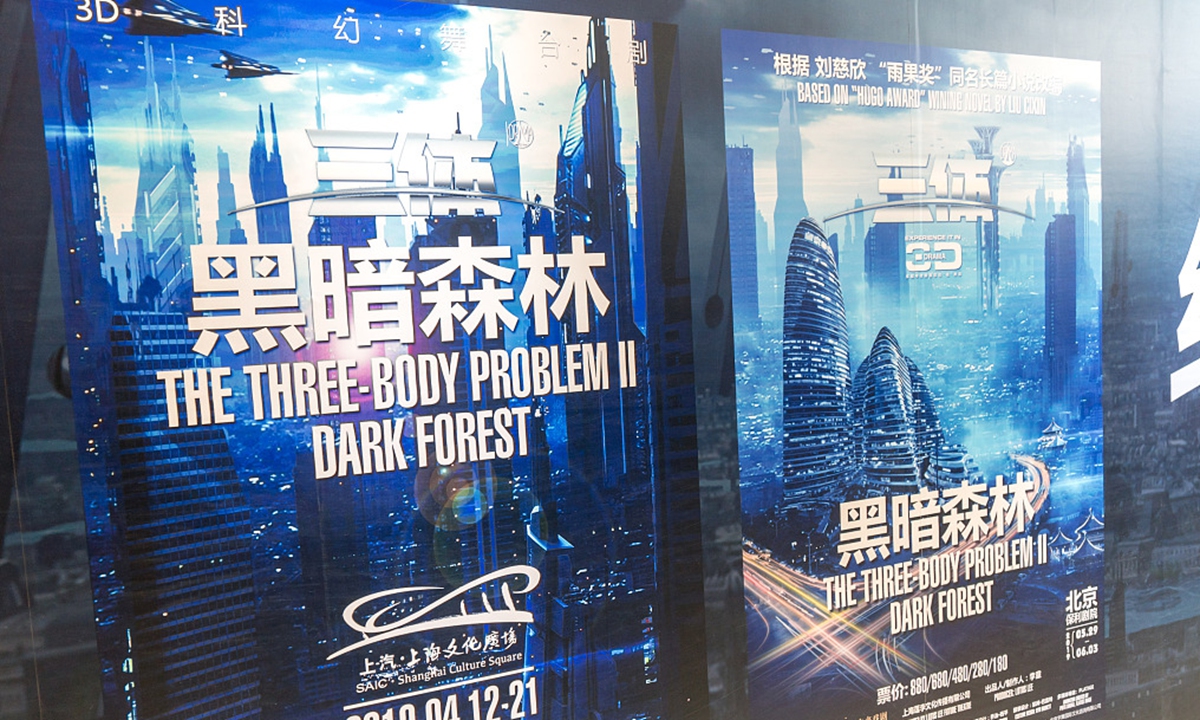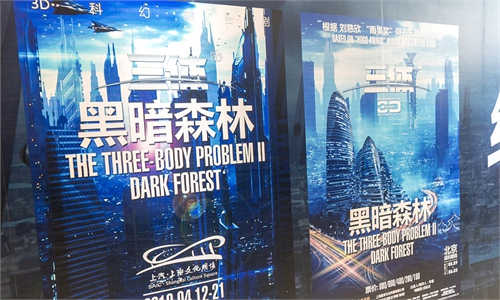Too few Asian faces? Netflix’s ‘The Three-Body Problem’ cast announcement sparks discussion

Poster of The Three-Body Problem II Dark Forest drama is seen in a shopping mall in Shanghai on March 17, 2019. Photo: CFP
The first members of the cast for Netflix's The Three-Body Problem adaptation were announced on Friday. The announcement came like a bomb on Chinese social media platform, as some netizens expressed dissatisfaction that many of the actors were not Asian and added they were worried that the story written by a Chinese author might be altered by Western values.
As another adaptation directed by Bai Yicong is also being produced by Chinese streaming giant Tencent, observers said it is inevitable that the two will be compared, but it is hard to predict which one will gain acceptance among audiences.
The best-selling series of books, officially the Remembrance of Earth's Past trilogy but more often referred to as The Three-Body Problem after the first book in the series, was written by Chinese writer Liu Cixin, who won a Hugo Award in 2015 for the translated English version of the first book.
Twelve stars were announced on Friday, but their roles were not revealed. Asian faces include Tsai Chin, who starred in Lucky Grandma and Shang-Chi and the Legend of the Ten Rings; Liam Cunningham, who had roles in The Last Voyage of the Demeter, Game of Thrones and Hunger; Jess Hong from Inked and The Brokenwood Mysteries, and Benedict Wong, from Doctor Strange, Nine Days and Raya and the Last Dragon fame.
The director of the Netflix series is Derek Tsang from Hong Kong, who also directed the youth crime movie Better Days, which was nominated for the 93rd Academy Awards.
Tsang has also won awards for his 2016 film Soul Mate, which also contained themes about youth and romance.
Some Chinese netizens had a positive take on the news, expressing excitement toward the cast and the director.
"I hope the production team can recreate the scenes and storylines of the masterpiece by Liu Cixin. Netflix should have the capability to do it," one of Liu's fans commented on Sina Weibo.
However, many netizens questioned whether the casting included enough Asian faces.
"I hope the series will not become a story about Western people saving the world. I will pay close attention to the following announcements," another Sina Weibo user wrote.
"The series is an important step in Netflix's Asian plan. The platform has produced series in several areas of Asia such as Japan and South Korea, and this time it has selected The Three-Body Problem," Shi Wenxue, film critic based in Beijing, told the Global Times
He added that for the film version, Liu has repeatedly turned down offers from James Cameron, explaining that The Three-Body Problem violates the fundamental principle of "black and white themes" present in Hollywood science fiction films.
The Netflix-produced 2021 South Korean series Squid Game has been sweeping the world.

Poster of The Three-Body Problem II Dark Forest drama is seen in a shopping mall in Shanghai on March 17, 2019. Photo: CFP
The first members of the cast for Netflix's The Three-Body Problem adaptation were announced on Friday. The announcement came like a bomb on Chinese social media platform, as some netizens expressed dissatisfaction that many of the actors were not Asian and added they were worried that the story written by a Chinese author might be altered by Western values.
As another adaptation directed by Bai Yicong is also being produced by Chinese streaming giant Tencent, observers said it is inevitable that the two will be compared, but it is hard to predict which one will gain acceptance among audiences.
The best-selling series of books, officially the Remembrance of Earth's Past trilogy but more often referred to as The Three-Body Problem after the first book in the series, was written by Chinese writer Liu Cixin, who won a Hugo Award in 2015 for the translated English version of the first book.
Twelve stars were announced on Friday, but their roles were not revealed. Asian faces include Tsai Chin, who starred in Lucky Grandma and Shang-Chi and the Legend of the Ten Rings; Liam Cunningham, who had roles in The Last Voyage of the Demeter, Game of Thrones and Hunger; Jess Hong from Inked and The Brokenwood Mysteries, and Benedict Wong, from Doctor Strange, Nine Days and Raya and the Last Dragon fame.
The director of the Netflix series is Derek Tsang from Hong Kong, who also directed the youth crime movie Better Days, which was nominated for the 93rd Academy Awards.
Tsang has also won awards for his 2016 film Soul Mate, which also contained themes about youth and romance.
Some Chinese netizens had a positive take on the news, expressing excitement toward the cast and the director.
"I hope the production team can recreate the scenes and storylines of the masterpiece by Liu Cixin. Netflix should have the capability to do it," one of Liu's fans commented on Sina Weibo.
However, many netizens questioned whether the casting included enough Asian faces.
"I hope the series will not become a story about Western people saving the world. I will pay close attention to the following announcements," another Sina Weibo user wrote.
"The series is an important step in Netflix's Asian plan. The platform has produced series in several areas of Asia such as Japan and South Korea, and this time it has selected The Three-Body Problem," Shi Wenxue, film critic based in Beijing, told the Global Times
He added that for the film version, Liu has repeatedly turned down offers from James Cameron, explaining that The Three-Body Problem violates the fundamental principle of "black and white themes" present in Hollywood science fiction films.
The Netflix-produced 2021 South Korean series Squid Game has been sweeping the world.


